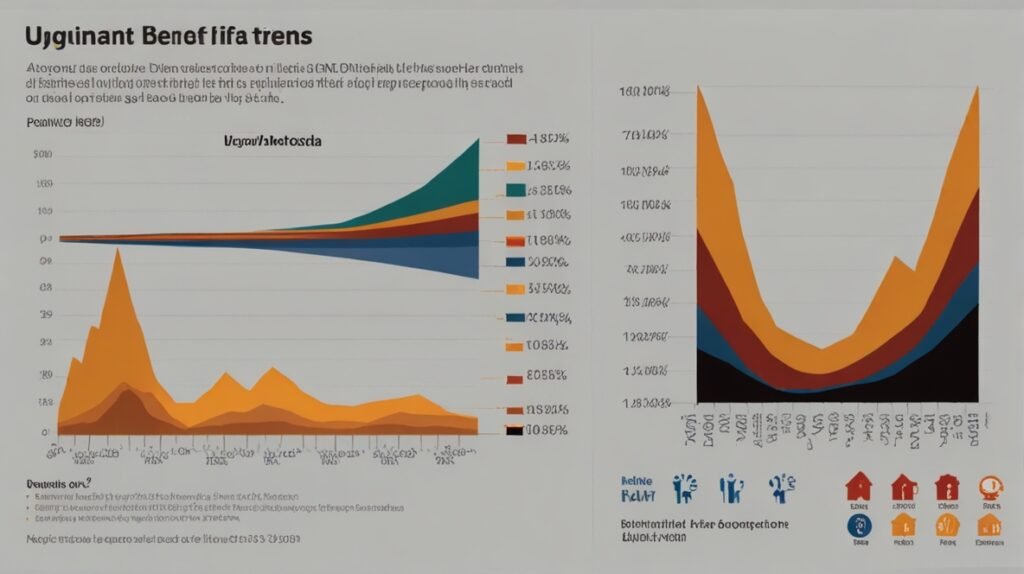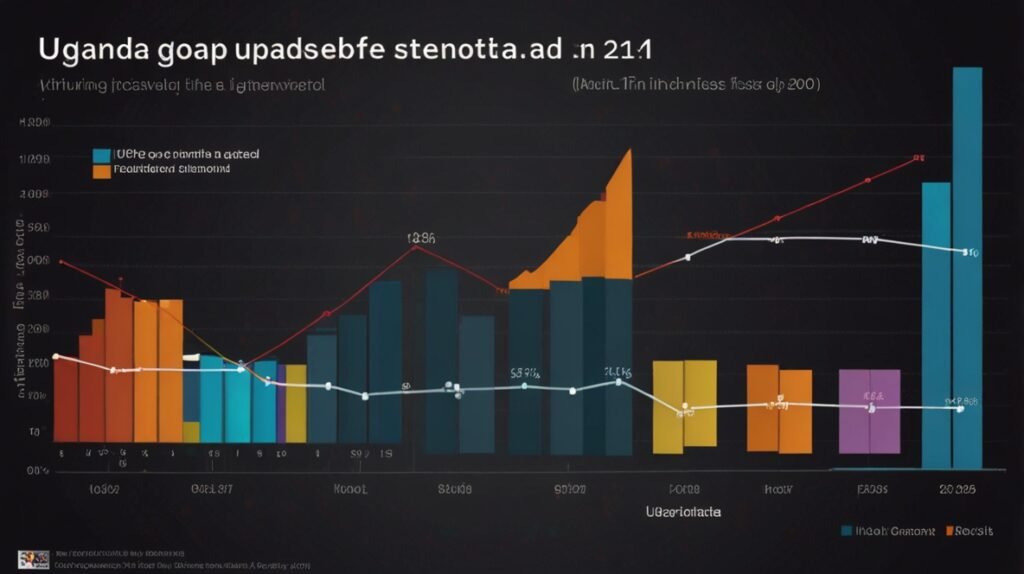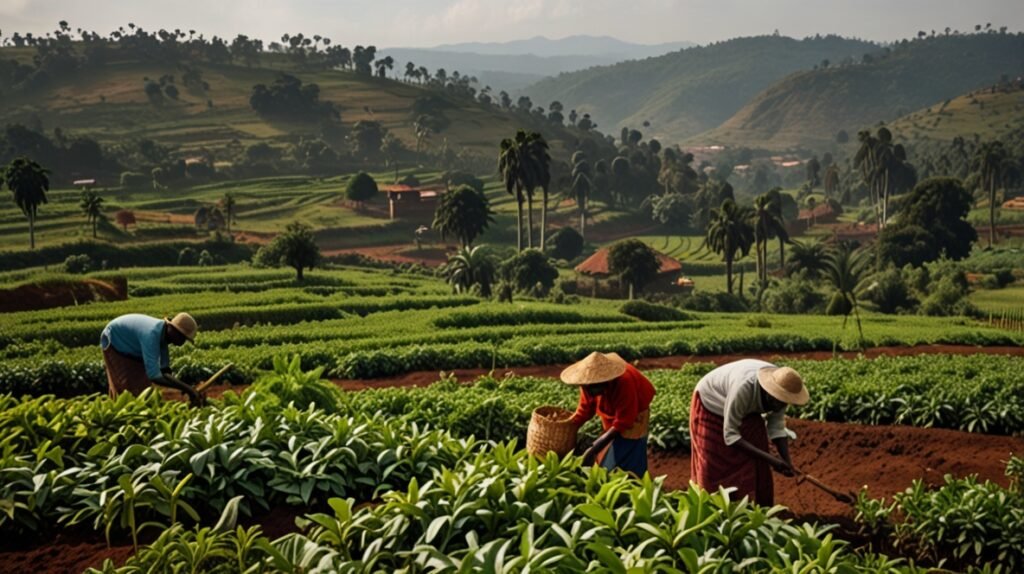Standard Economy of Uganda

1. Show
The standard economy of Uganda is profoundly grounded in its agrarian way of life and nearby practices.
Before the presence of expansionism and modernization, Uganda’s economy essentially spun around suggests development, deal exchange, and neighborhood structures.
This kind of economy was molded by the climate, social plans, and social possible increases of individuals.
While present day money related plans have basically impacted Uganda’s new turn of events, understanding the standard monetary plan offers basic snippets of data into how nearby practices keep on anticipating a segment in the country’s common regions.
1.1 The Chance of a Standard Economy in Uganda
A standard economy is regularly portrayed by suggests based sorts out, in which work and things are conveyed essentially for individual use as opposed to for exchange or benefit.
The money related exercises are passed down beginning with one age then onto the following, constantly depending upon work raised techniques, nearby assets, and manual mechanical gatherings.
In Uganda, this ordinary economy has driven forward in different country regions, where farming, fishing, and limited scope makes keep on overwhelming.
2. Agribusiness in the Standard Economy of Uganda

Agribusiness is the supporting of Uganda’s standard economy.
For a genuinely critical time span, it has been the central wellspring of vocation for most of everyone, giving food, place of refuge, and materials for dress.
Creating rehearses in Uganda’s standard economy are generally settled on confined scope resource creating, where families cultivate yields and back subdued animals to meet their central essentials.
2.1 Yield Progression
Crop improvement has been a focal piece of Uganda’s standard economy.
The useful soil and ideal environment of Uganda considered the progression of different harvests, including staple food sources like bananas, millet, cassava, and maize.
These yields were filled in family plots utilizing direct gadgets like scrubbers, and the assemble was fundamentally for family utilization.
Excess harvests were a large part of the time traded with neighbors through deal frameworks, adding to a limited sort of exchange.
2.1.1 Intercropping Practices
Intercropping was a normal green practice in standard Uganda, where various yields were made on a near plot of land.
This methodology assisted with streamlining land use and confirmation food security. For instance, maize would be developed close by beans or yams, guaranteeing that various kinds of food were open dependably.
2.1.2 Procure Turn and Soil Abundance
Crop turn was one more fundamental piece of ordinary Ugandan creating. Ranchers would turn various kinds of harvests in their fields to remain mindful of soil riches and impede soil consumption.
This getting ready was sincere in a technique economy where the land was a fundamental asset, and soil degradation could incite food needs.
2.2 Animals Raising
Animals raising comparatively anticipated a monstrous part in Uganda’s standard economy. Steers, goats, sheep, and poultry were raised for different purposes, including food, clothing, and as an image of riches.
In different Ugandan social class, steers were especially immense and filled in as a food source as well as a sort of money in genial exchanges like lady regard (reimbursement) and neighborhood.
2.2.1 Pastoralist Social class
Pastoralism was average in Uganda’s dairy steers keeping locales, as Karamoja in the northeastern piece of the country.
In these associations, animals was head to both the economy and social turn of events.
The abundance of a family was usually evaluated by how much dairy steers they ensured, and cows were traded for things or utilized as a piece of typical courses of action, like marriage strategies.
2.2.2 The Control of Prepared animals Consequently
Animals in addition added to the arrangement exchange frameworks Uganda’s customary economy.
As a compromise for different things like grains or vegetables, prepared animals proprietors would exchange milk, meat, stows away, or even the veritable creatures.
This kind of exchange was colossal for watching out for the area too concerning remaining mindful of social ties between various get-togethers and families.
3. Fishing in the Standard Economy
Fishing was one more fundamental piece of Uganda’s standard economy, particularly for networks living around the lakes and streams.
Uganda is home to the world’s second-most noteworthy freshwater lake, Lake Victoria, and different lakes, like Lake Kyoga and Lake Albert.
These water bodies gave fish as a basic wellspring of protein for the nearby people groups.
3.1 Standard Fishing Procedures
In Uganda’s standard economy, fishing was done utilizing fundamental strategies and mechanical gatherings. Anglers utilized kayaks, lances, nets, and traps made using locally open materials. Fishing was fundamentally finished on a confined scale, with the catch made game plans for adjoining use.
In any case, overflow fish were from time to time dried or smoked and exchanged with associating networks.
3.2 Fish as an Exchange Item
Fish moreover expected a basic part in the arrangement exchange frameworks of Uganda’s normal economy. Dried or smoked fish could be safeguarded for basic stretches and exchanged for other fundamental things like grains or animals.
Fishing social class periodically participated in kind with inland creating associations, making a typically useful trade framework.
4. Bargain Exchange the Customary Economy of Uganda

Bargain exchange was the crucial system for trade Uganda’s standard economy. Before the presentation of current money, networks depended after exchanging work and things straightforwardly.
The plan structure depended upon correspondence, where item were traded for different aftereffects of seen indistinguishable worth.
This design was essential for keeping an eye on the necessities of people and families in a pre-industrialized society.
4.1 Item Exchanged Arrangement Frameworks
Such things traded bargain exchange were special and changed beginning with one region then onto the following.
In agrarian associations, excess yields, animals, and fish were consistently exchanged for different things like hand tweaked contraptions, stoneware, or apparel materials.
The trade was conventionally accommodating and taking into account ordinary trust between the get-togethers being alluded to.
4.1.1 Neighborhood Specialization and Exchange
Neighborhood specialization expected a key part in Uganda’s trade structure.
Two or three associations had conventional inclusion with the improvement of unequivocal item, like pottery, ironworking, or holder contorting around, which they would exchange with lining organizations.
This specialization contemplated a seriously shifting economy and the trading of various kinds of things across locale.
4.2 Social and Money related Affiliations
Deal exchange standard Uganda was a money related action as well as a social one.
The appearance of exchanging upheld relationship among families and gatherings, making relationship of shared reliance.
Associations would routinely participate consequently during get-togethers, organizations, or market days, making it a fundamental piece of normal life.
5. Craftsmanship and Conventional Associations

In Uganda’s customary economy, craftsmanship and confined scope associations anticipated a fundamental part in giving things to normal use.
Different social class tended to noteworthy master in standard qualities like contorting around, stoneware, and blacksmithing, which were key to improve gadgets, dress, and family things.
5.1 Turning around and Basketry
Curving around was a typical practice in different Ugandan social class.
Utilizing locally open materials like banana leaves, reeds, and palm fronds, gifted craftsmans would make canisters, mats, and other family things.
These woven things were major for aggregating, transport, and normal living, and they were from time to time exchanged for food or prepared animals in the trade structure.
5.2 Stoneware and Ceramics
Ceramics was one more tremendous specialty in the normal Ugandan economy.
Soil was abundant in different areas, and potters utilized it to make cooking pots, water limit holders, and other family things. Stoneware was especially critical in bargain exchange, as it was a tough and primary concern for cooking and putting away.
5.3 Ironworking and Blacksmithing
Smithies in standard Ugandan social class were remarkably gifted specialists answerable for making devices and weapons.
They utilized iron mineral to make things like cultivators, front lines, lances, and creating contraptions, which were major for developing creation.
These iron gadgets were consistently exchanged for food, animals, or different item in the trade structure.
6. The Control of Ladies in the Standard Economy
Ladies anticipated an essential part in Uganda’s standard economy. While men were a huge piece of the time answerable for rehearses like hunting, fishing, and blacksmithing, ladies were crucial for development, food managing, and family the heap up.
Their obligations were key for the persistence and thriving of the area.
6.1 Ladies’ Part in Developing
In standard Ugandan social class, ladies were chiefly at risk for planting, weeding, and reaping crops. They regulated family plots and dependable that enough food was conveyed for the family.
In different associations, ladies likewise participated in limited scope exchanging of excess harvests or carefully assembled things.
6.2 Food Dealing with and Storing up
Ladies were likewise answerable for food dealing with and amassing in the standard economy.
Resulting to collecting, they would oversee crops by drying, crushing, or creating them to safeguard them for soon.
This work was essential for guaranteeing food security, especially during times of inadequacy or dry spell.
7. Neighborhood Satisfying Work Designs
In Uganda’s standard economy, shared work structures were a typical practice, especially in developing works out.
Associations would get together to oversee huge augmentation tries, like clearing area, planting, or collecting crops. This satisfying framework depended upon shared help and correspondence, where people would help each other with the discernment that they would get help consequently when required.
7.1 The Control of Gathering Designs
Bunch frameworks expected a basic part in collecting public work in Uganda’s standard economy.
Bunches were more far away family packages that framed the central social unit in different associations. Family individuals would consistently partake on country attempts, make homes, and backing each other during difficult situations.
7.2 Work Trade and Social Ties
Work trade was about financial efficiency as well as about supporting social ties inside the area.
The appearance of taking part reinforced relationship among families and gatherings, fostering a vibe of mettle and composed exertion.
This natural strategy for overseeing work was an essential piece of Uganda’s customary economy, advancing both monetary and social flourishing.
8. Association and Asset Distribution
In Uganda’s customary economy, association and asset distribution were enthusiastically joined to social plans and social qualities.
Neighborhood managers, seniors, and faction pioneers expected a focal part in controlling ordinary assets like land, water, and reaching districts.
These pioneers were answerable for guaranteeing that assets were surrounded adequately and that fights over land or assets were settled.
8.1 Control of Standard Pioneers
Standard pioneers were responsible for observing all that and directing the task of land and different assets.
They went likely as focus people in talks about and were regarded figures inside the area. Their position depended upon lineage, competence, and social practices
9. Standard Business regions and Exchange Designs
In Uganda’s standard economy, markets were fundamental for the trading of work and things. Conventional business regions filled in as central focuses for exchange and social collaboration.
They were usually arranged in unambiguous districts and held at standard stretches, like bit by bit or month to month.
9.1 Arrangement of Normal Business regions
Customary business regions in Uganda were regularly outside spaces where transporters put up dials in a difficult spot or spread out their item on the ground.
These business regions were dynamic with different things, including green produce, animals, qualities, and family things. Agents from various associations would get together, working with the trading of things and social joint efforts.
9.1.1 Market Days and Close by social events
Market days were enormous parties in common Uganda. They permitted a significant chance to individuals to exchange stock as well as to meet with others, share news, and partake in area.
The business regions a significant part of the time included various dials back selling food, clothing, and contraptions, as well as districts for mixing and diversion.
9.2 Conveyance ways and Trade Affiliations
Conveying ways and trade networks anticipated a central part in accomplice different district and associations.
Standard exchange networks associated across Uganda and into lining nations, considering the trading of item like salt, iron, and materials.
These affiliations were thinking about obvious transportation ways, taking everything into account, and were remained mindful of through friendly and financial affiliations.
9.2.1 Between Friendly class Exchange
9.2.2 Arrangement Exchange Parts
End
The standard economy of Uganda offers a basic explore the obvious and social practices that have framed the country’s normal life.
Spread out fundamentally in suggests developing, deal exchange, and shared work frameworks, this economy has given food and social relationship to numerous years.
Regardless of what the impact of expansionism and modernization, standard practices keep on expecting an essential part in different country locale.
Understanding these practices is fundamental for regarding Uganda’s money related and social legacy, and it incorporates the strength and flexibility of its family in spite of advancing monetary strains.
FAQs
1. What is a standard economy?
A standard economy is a money related framework where work and things are made for individual use as opposed to for exchange or benefit.
It depends upon suggests agribusiness, bargain exchange, and typical work, and is normally considering customs and practices went down through ages.
2. How gigantic is development in Uganda’s normal economy?
Development is vital to Uganda’s normal economy. It gives the basic wellspring of food, safe house, and materials for apparel.
Ordinary creating rehearses coordinate resource creating, crop turn, and animals raising, which are fundamental for adjoining food.
3. What work does animals play in the standard economy of Uganda?
Animals is basic in Uganda’s standard economy, filling in as a wellspring of food, clothing, and a degree of riches.
Steers, goats, and sheep are especially immense, and they likewise anticipate a part in friendly exchanges, for example, lady cost and neighborhood.
4. How does fishing add to Uganda’s ordinary economy?
Fishing is an essential improvement for networks living close to lakes and streams. It gives a critical wellspring of protein and adds to neighborhood exchange.
Standard fishing strategies consolidate principal devices and methodology, and fish is as frequently as conceivable dried or smoked for insurance and exchange.
5. What is bargain exchange, and how should it limit in Uganda’s standard economy?
Bargain exchange consolidates trading work and things obviously without the utilization of cash.
In Uganda, bargain exchange was utilized to acquire chief work and things through ordinary approaches, with excess harvests, animals, and qualities being exchanged for other required things.
6. What are two or three average specialties and standard associations in Uganda?
Conventional craftsmanships incorporate bending around, pottery creation, and ironworking.
These expressive arts are key for making standard things like compartments, cooking pots, and creating contraptions. Standard undertakings support the nearby economy and reflect social practices and limits.
7. How do standard business regions work in Uganda?
Standard business regions are outside spaces where shippers exchange stock like food, strengths, and family things.
These business regions go probably as enormous conditions for exchange and social correspondence, with market days giving doorways to neighborhood and trade.
8. What work do ladies play in Uganda’s standard economy?
Ladies are essential in standard agribusiness, food dealing with, and exchange.
They control family plots, cycle and store food, and partake in bargain exchange, contributing fundamentally to the family and neighborhood.
9. How achieves the typical work framework work in Uganda’s conventional economy?
Typical work frameworks consolidate individuals from the area on attempts like creating, building, or land clearing.
This framework creates support and shared help, and strengthens social ties inside the area.
10. What influence did expansionism have on Uganda’s standard economy?
Expansionism presented cash crops, land residency changes, and new financial strategies that angry common natural practices and exchange structures.
These developments changed land use and financial necessities, influencing neighborhood associations and their standard lifestyles.
11. How has modernization impacted Uganda’s normal economy?
Modernization has presented new advances and monetary plans, changing standard practices.
While modernization has carried cash related advancement and managed suspicions for conventional comforts, it has comparatively made difficulties for shielding standard practices and adjusting to new financial veritable factors.
12. What is the control of standard pioneers in Uganda’s economy?
Standard pioneers direct the piece of assets, resolve clashes, and keep social control.
They expect a desperate part in managing total assets and guaranteeing fair vehicle, which is key for the working of the customary economy.
